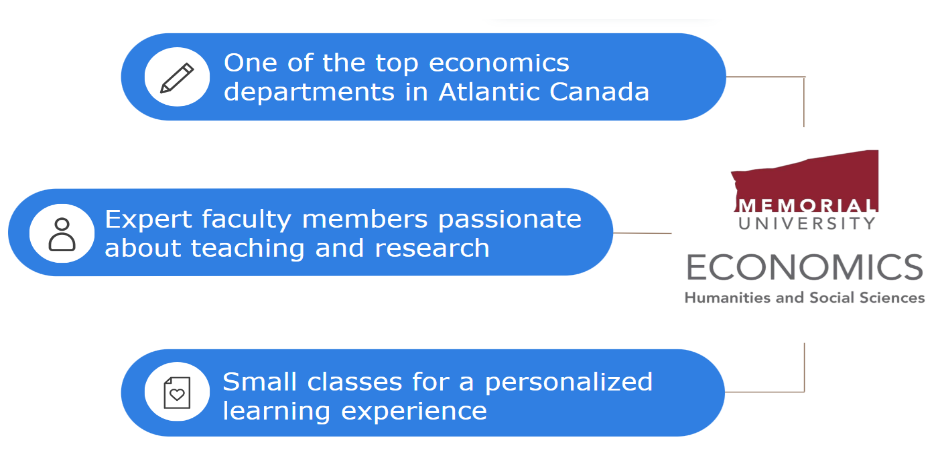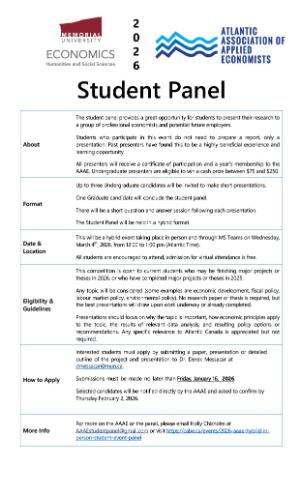



ECONOMICS @Memorial
The Department of Economics at Memorial University is a leading organization in Atlantic Canada for impactful research, regional policy engagement and excellence in undergraduate and graduate learning.

Our slogan is Real World Skills. It reflects our commitment to training you with the skills needed to succeed in your career.
Read our alumni testimonials to hear from former undergraduate and graduate students about how their time in our department helped shape their personal and professional journeys.
Latest News
Constitutional Crossroads
February 26, 2026
Dr. Blair Long, Assistant Professor of Economics, will participate in a roundtable discussion hosted by The Nexus Centre on secularism and the notwithstanding clause.
Dr. Long joins co-panelists Amélie Barras (York), Dia Dabby (UQAM), Meg Gaudet (MUNL), Syed Adnan Hussain (St. Mary's) and Jennifer Selby (MUNL).
Date: March 2nd.
Time: 12:00pm to 1:00pm NT.
Location: SN 4022 and Online
We hope to see you there!
Future of Careers in Economics
February 25, 2026
Our MUN Economics Society student group is hosting a panel discussion on the future of interdisciplinary careers in economics, followed by an open student Q&A with professionals from academia, government, and the private sector.
Date: March 6, 2026
Time: 5–7 PM
Location: IIC 2001 (Bruneau Centre for Research and Innovation)
Register via the link in bio or scan the QR code on the poster.
Open to students from all faculties.
New Grant for Research on Local States in NL
February 24, 2026
Dr. Blair Long, Assistant Professor, received a research grant from the Law Foundation of Newfoundland and Labrador for his research, "The Evolution of Local States in Newfoundland and Labrador Since Confederation."
The Law Foundation offers grants from individuals and organizations on projects that align with one or more of the statutory objects, be law-related, and provide meaningful benefits to the people of Newfoundland and Labrador. Valued at about $5,000, this grant supports Dr. Long’s ongoing work on the historical determinants of state capacity in the province.
Public Consultation Ahead of Spring 2026 Budget
February 24, 2026
Dr. Tony Fang, Professor & Stephen Jarislowsly Chair, was interviewed recently on VOCM’s Your Money, The Financial Show with Nancy Snedden. Dr. Fang was a panelist with Jason Hillyard (CEO of Chartered Professional Accountants of NL) and Jonathan Galgay (Director of Legislative Affairs NL, Canadian Federation of Independent Business).
The topic of conversation was the public consultations ahead of the spring provincial budget. “The big issue here is the balance between the short term expenditure and long-term investment.”
Listen to the full interview here.
Save The Date: Guest Speaker on February 20th
February 16, 2026
This Friday, February 20th from 1:00pm to 2:30pm, Dr. Blier-Wong (University of Toronto) will visit Memorial University to present his ongoing work on representation learning for insurance pricing.
Dr. Blier-Wong combines actuarial science, statistics and machine learning to the economic analysis of insurance markets.
This event is taking place in the Business Administration Building, room BN-3007. We look forward to seeing you there!
Keep an eye on our Speaker Series webpage for future events here.
Informal Property Rights and State Capacity
February 16, 2026
Dr. Blair Long, Assistant Professor, has just released a new research paper in the Memorial Economics Working Paper Series.
The study combines economics, geography and history to explore the interaction between legal and fiscal elements of state capacity by studying the persistent effects of a historical informal property rights regime on the long-run formation of local states.
Our new Working Paper Series provides faculty members with a forum for early dissemination of ongoing research. We also release winning papers of the Economics Society undergraduate and graduate "Best Paper" competitions and other notable student essays.
Read Dr. Long's new paper and past releases from faculty and students here.
$6 Million in Funding for Productivity Research
February 16, 2026
The federal government has just announced a 15-year, $6 million research grant titled "Building a More Productive Canada: A Research Partnership for National Prosperity" focusing on improving Canada’s productivity. Memorial University is one of six university partners for this important national initiative. Dr. Tony Fang, Professor & Stephen Jarislowsky Chair, is the lead at Memorial University for this project.
See more information here.
Economic Impacts from Trade to Higher Education
February 16, 2026
Dr. Lynn Gambin, Associate Professor and Head, was interviewed twice recently by The Telegram.
A year into US-Canada trade tensions and tariff threats, Dr. Gambin was asked to comment on implications for Newfoundland and Labrador. In an interview with The Telegram, Dr. Gambin commented on the importance of Canada looking at ways to limit the negative impacts of an ever-changing tariff landscape. See “One Year After U.S. Tariffs, Where Does Newfoundland and Labrador Stand?”
Dr. Gambin was also interviewed for an article in The Telegram on Memorial University's impact on Newfoundland and Labrador. See "Hard Course: Memorial University More Than an Economics Driver in Flux."
New Alumni Testimonials
January 30, 2026
We are delighted to share new alumni testimonials from recent graduates of our Bachelor's and Master's degree programs.
Our alumni testimonials offer reflections from former students about their experiences, insights, and the value they found in earning an economics credential. We are proud to feature the following students:
- Moshfeka Akhter (BSc Economics)
- Keigan Butler (BSc Economics)
- Shah Labib Hasan (BSc and MA Economics)
- Aiyan Raaid (BSc Economics and Computer Science)
- Ian Scott (BA Economics and Geography).
Read their stories on our testimonials page here.
Congratulations, Team Young
January 26, 2026
Congratulations to Nathan Young (BA Economics and BComm, 2025) and Team on winning the 2026 Newfoundland and Labrador Tankard.
With this win, Team Young will compete on home ice at the 2026 Montana's Brier, February 27th to March 8th.
Check out the final shot to win it all here.
Long-Term Future Skill Needs of NL
January 23, 2026
Dr. Tony Fang, Professor and Stephen Jarislowsky Chair, was on CBC's The Signal to discuss the long-term future skill needs of Newfoundland and Labrador. He was joined by Tom Cooper (Memorial, Business), Rhonda Tulk-Lane (Atlantic Chamber of Commerce, CEO), and Wanda Cuff Young (Work Global Canada Inc., VP of Operations).
"Unfortunately, one third of the businesses in Canada are facing prolonged labour skill shortages and hiring difficulties."
Listen here.
Watch here.
In Review Fall 2025 Newsletter
January 19, 2026
Check out the latest issue of our In Review newsletter!
Our In Review newsletter was launched in 2024. In each issue, we take a look back at the recent accomplishments of our faculty, instructors, students and alumni from the past few months.
Our newsletter showcases the remarkable contributions to academic research, policy engagement, student development and alumni success that epitomize the Department of Economics as a place to learn and grow.
Closing the Skill Gap in 2026
January 15, 2026
Dr. Tony Fang, Professor & Stephen Jarislowsky Chair, addresses long-term future skill needs at a time of economic uncertainties and rapid technological changes.
"A lot of firms, especially SMEs, tend to focus on short-term hiring problems rather than long-term workplace planning issues. They tend to over-emphasize on credentials, like educational credentials and work experience and so on, rather than skills needs."
Read the story here.
AAAE Student Panel 2026
2026-01-07
Economics students, consider submitting your research to the AAAE Student Panel.
The student panel provides a great opportunity for students to present your research to a group of professional economists and potential future employers.
Students who participate in this event do not need to prepare a report, only a presentation. Past presenters have found this to be a highly beneficial experience and learning opportunity.
All presenters will receive a certificate of participation and a year’s membership to the AAAE. Undergraduate presenters are eligible to win a cash prize between $75 and $250.
This will be a hybrid event taking place in person and through MS Teams on Wednesday, March 4th, 2026, from 12:00 to 1:00 pm (Atlantic Time).
Interested students must apply by submitting a paper, presentation or detailed outline of the project and presentation to Dr. Derek Messacar at dmessacar@mun.ca.
Submissions must be made no later than Friday, January 16, 2026.
Quoi de neuf? Robustify Your Life With Risk Theory
2026-01-07
Dr. Jean-Gabriel Lauzier, Assistant Professor, will speak in the Nexus Centre's "Quoi de neuf" French-language public speaker series this evening about how to robustify your life with risk theory.
A very timely topic in this world of uncertainty!
Check it out in person or Zoom.
Policy-Relevant Elective on Health Economics
2026-01-07
If you are looking for a policy-relevant course, health economics gives you a practical framework for understanding how resources and incentives influence health care and public health outcomes. The course is taught by our Department Head, Dr. Lynn Gambin.
This course equips you with real world skills, so you can take part in the economic policy discussions that shape the future of health care in our province. The only prerequisite is ECON 1010.
Keep In Touch!















